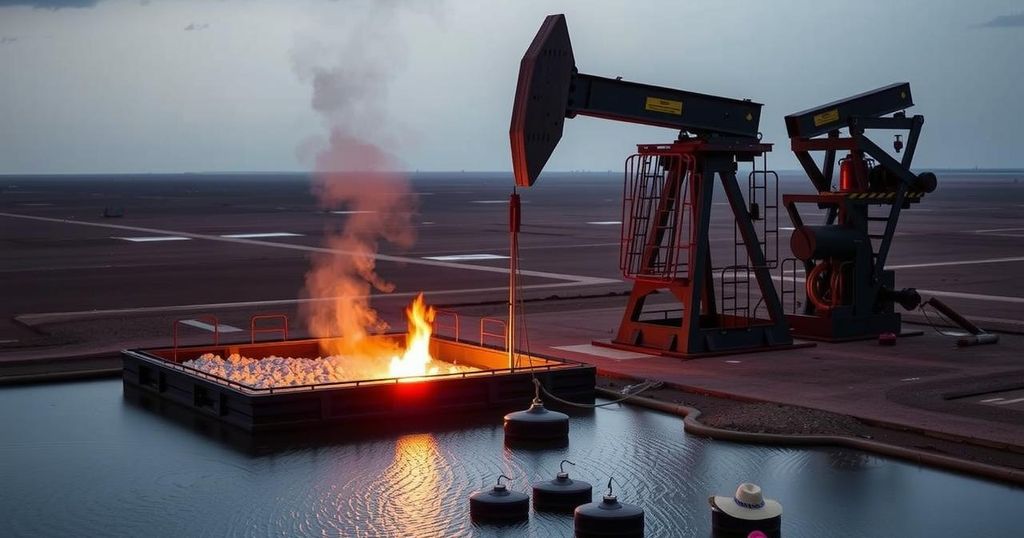South Sudan Sets to Resume Oil Production Amid Health and Environmental Concerns

South Sudan plans to resume oil production at a rate of 90,000 barrels per day after a lengthy suspension due to the conflict in Sudan. The decision follows the lifting of a force majeure clause and underscores the country’s reliance on oil for its economy. While government officials emphasize the importance of oil for development, citizens express concern over health impacts from fossil fuel dependency.
This week, South Sudan officially declared its intention to recommence oil production, targeting a daily output of at least 90,000 barrels of crude oil. This development follows a significant disruption in oil supply to international markets, which was halted last February due to the ongoing conflict in Sudan. Oil exports are crucial for South Sudan, accounting for a staggering 90% of its Gross Domestic Product (GDP).
The interruption was the result of Sudan invoking the force majeure clause, a legal provision that relieved it from obligations amid the escalating conflicts in Khartoum earlier this year. However, the lifting of the ban on January 4 has paved the way for South Sudan to resume its production activities.
Puot Kang Chol, the Minister of Petroleum, announced that production would officially restart on January 8, 2025, describing this date as a long-awaited “D-Day”. He reaffirmed South Sudan’s commitment to maintaining its oil production despite the growing global trend towards renewable energy solutions. “We will continue to produce…the continent called Africa will continue to use oil resources for its own survival,” Chol stated.
In contrast, citizens like Betty Yobu express concerns regarding the health repercussions of reliance on fossil fuels. Living in Juba, Yobu has battled a chronic heart condition, worsened by toxic exposure from charcoal stoves she has used in her restaurant to meet the demands of her low-income clientele. She attributes her declining health to her prolonged exposure to harmful gases.
Despite such hazards, Chol remains resolute in leveraging oil resources, asserting that they are essential for the nation’s development and well-being. He highlighted the stark reality faced by many, stating, “Now, we are faced with the reality…the only resource that you have that can allow you health care is the oil resources. We will not abandon it, because death is death.”
In a previous discussion, former Finance Minister Agak Achuil mentioned that South Sudan’s oil sales were guaranteed until 2027, a statement for which he later claimed he was misquoted. His dismissal shortly thereafter underscores the complexities surrounding the management of the oil sector.
Environmental advocates have continuously critiqued the nation’s oil industry. In 2018, lawmakers accused the Dar Petroleum consortium of irresponsible waste disposal near oil extraction sites. Ministry of Environment and Forestry undersecretary Joseph Africano Bartel emphasized the need for stringent environmental protections prior to resuming operations in contested oil blocks 3 and 7.
Despite the various challenges and criticisms ahead, both South Sudan and Sudan maintain a hopeful outlook that reviving oil production will significantly alleviate financial stress for both nations. South Sudan ranks third in sub-Saharan Africa for its oil reserves, with a production capacity of approximately 3.5 billion barrels annually.
South Sudan’s economy heavily relies on its oil reserves, contributing immensely to its GDP and providing critical revenue for government operations. The conflict in neighboring Sudan had led to a substantial disruption of oil exports, prompting the declaration of force majeure—This legal term signifies circumstances beyond control that hinder contractual duties. The recent decision to resume oil production follows the lifting of this clause, which is seen as a pivotal moment for South Sudan in revitalizing its economy amidst ongoing socioeconomic challenges.
In conclusion, South Sudan’s plan to resume oil production marks a significant step towards recovery following a prolonged hiatus due to the conflict in Sudan. With oil being a cornerstone of its economy, the government is adamant about utilizing these resources for national development, prioritizing immediate economic survival over environmental concerns. The diverse perspectives from government officials and citizens alike highlight a critical tension in balancing economic imperatives with public health and environmental sustainability.
Original Source: www.voanews.com








